The central bank of Yemen announced Tuesday it had floated the national currency, instructing banks to follow the market rate in a move aimed at shoring up a financial system battered by war.
The move by the internationally recognised authorities based in the port city of Aden is an acknowledgement of the yawning gap between the official exchange rate of the riyal and its black market valuation in an imploding economy.
A circular late on Monday said the Aden bank had ditched the official rate of 250 riyal to the U.S. dollar in favour of “the exchange rate prevalent in the market … in accordance with the exchange rate lists issued by the central bank”.
The statement did not specify a new rate, but the riyal trades for around 350 to the dollar in the black market.
Yemen is split between territories controlled by the government based in Aden, which is backed by a Saudi-led military coalition, and those run by its enemies in the armed Houthi movement around the capital Sanaa.
Authorities and people on both sides of the divide use the Yemeni riyal.
But the rival central bank in Sanaa has not agreed to implement the exchange rate decision, an official source there told Reuters, adding that it could deepen economic pain in a country facing mass hunger and disease.
“Most of the population is based in northern areas, along with most of the banks, exchange centres and importers,” the official said on condition of anonymity.
“The decision would have more of an impact here and will increase the price of goods.”
Arid and mountainous, Yemen has historically imported up to 90 percent of its food, mostly through the Red Sea port of Hodeidah which is beyond the writ of the Aden bank.
Both the central banks suffer from depleted reserves but play a key role in mitigating Yemen’s worsening humanitarian crisis by paying some public sector salaries.
Wages have not been disbursed by the Aden bank to most workers in northern lands since September, however, amid a political dispute over who is eligible for compensation.
Lack of funding has hit sanitation and health care hard, contributing to a cholera epidemic which has infected half a million people and killed nearly 2,000.
The Houthis accuse the Aden-based government of using its central bank to sap northern society, while the government say the Houthis funnels public sector wages to its fighters.
Abdulrahman Al-Eryani, the chief economic officer of Yemen’s embassy in Washington, described the currency float as an “economic reform step … (which) addresses the wide divergence between the former official rate and unofficial rate”.
The war has halted the modest oil exports which once funded most of Yemen’s budget and foreign currency earnings, reserves of which are dwindling.
“This is a great chance to stabilise the economy, but the bank’s next challenge is to show it can provide enough foreign exchange,” Yemeni economic analyst Amal Nasser said.
It still struggles to impose its authority and the central bank complained this week to its allies in the Saudi-led coalition that they had stalled in approving the delivery of currency needed to pay salaries.
Source: Reuters
